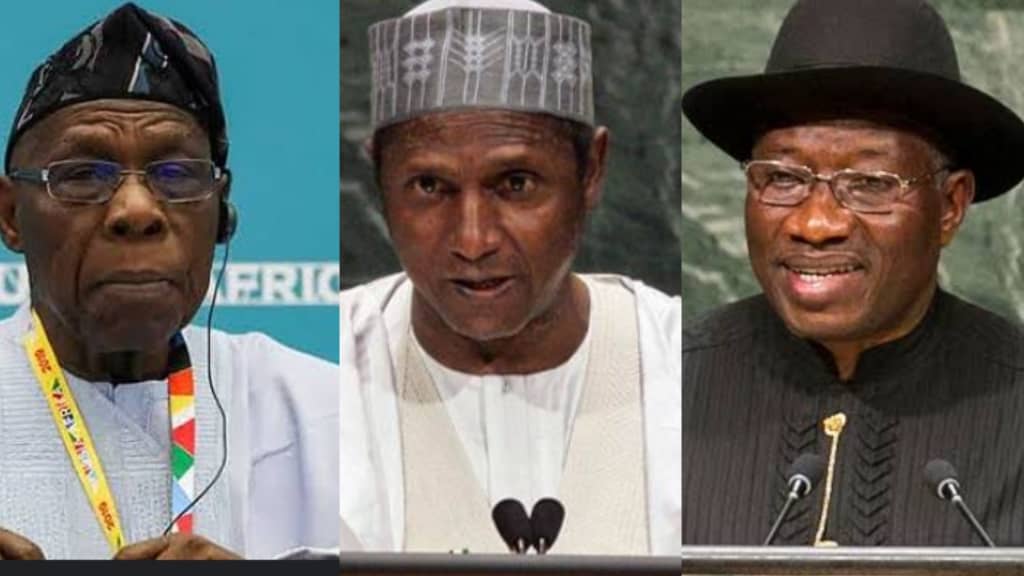Headlines
Federal Government Repaying 69 Loans Incurred by Past Presidents- World Bank

The Federal Government has commenced the repayment of 69 loans inherited from the Obasanjo, Yar’Adua, and Jonathan eras.
According to the World Bank Group Finances, Nigeria’s current administration is still paying off loans amounting to $10.6 billion which were obtained during the tenures of former Presidents Olusegun Obasanjo, late Umaru Musa Yar’Adua and Goodluck Jonathan.
Nigeria’s overall domestic and foreign debt had amounted to N121.67 trillion ($91.46 billion) according to the Debt Management Office, as of March 31st, 2024.
N65.65 trillion ($46.29 billion) was attributed to domestic debt, while N56.02 trillion ($42.12 billion) represented external debt in the total amount mentioned above.
Obasanjonews.com investigation reveals that the present administration, solely in its inaugural year, took a loan amounting to $4.95 billion, thereby intensifying the burden of external debt.
Between 2019 and 2024, the Central Bank of Nigeria disclosed that $15.55 billion had been dedicated to debt payment purposes.
Read Also; FG Announces Single-Digit Interest Loans for Media Firms from BOI
The Nigerian government is in the midst of reimbursing a minimum of 69 loans acquired from 2000 to 2014 as per the digital finance platform of World Bank Group.
Numerous loans were delineated by the platform, which enables public access to financial data and portfolio information pertaining to all bodies within the World Bank Group.
Some of the loans that are yet to be fully paid back were taken out in 2000. These include the Community-Based Poverty Reduction Project ($60 million), Second Primary Education Project ($55 million), Economic Management Capacity Building Project ($20 million) and Small Town Water Supply and Sanitation Programme Pilot Project ($5 million).
Loans acquired by the government in 2001 comprised $100 million for the Transmission Development Project, $114 million for the Privatisation Support Project, and $90.3 million designated to aid HIV/AIDS Programme Development.
In 2002, four loans totaling $438 million were obtained by the Federal Government. These included the Second Health System Development loan of $127 million, the Community-Based Urban Development Project loan worth $110 million, and the Lagos Urban Transport Project that secured a sum of $100 million. The Universal Basic Education Project also received funding in amounting to approximately $101 million.
From 2003 to 2005, the government secured loans from WB totaling $1.1bn which are yet to be fully settled. Amongst these loans is included titles such as Local Empowerment and Environmental Management Project ($70m), Second FADAMA Development Project ($100m), Micro, Small and Medium Enterprises Project ($32m), Federal Government Economic Reform and Governance Project($140m)as well as Sustainable Management of Mineral Resources loan contract costing ( $120 million).
The government obtained a loan amounting to $4 billion from 2006 until 2010, and an additional $4.3 billion in loans from 2011 through 2014. These funds are presently being paid back as of the latest platform update on June 30th, 2024.
Several loans were acquired in 2006, including the Lagos Metropolitan Development and Governance loan ($200m), the Avian Influenza Control and Human Pandemic Preparedness and Response Project for Nigeria loan ($50m), as well as the Malaria Control Booster Project loan ($180m).
The platform discloses that the loans fall into two categories: those provided by the International Bank for Reconstruction and Development (IBRD) and the International Development Association (IDA), both of which are part of the World Bank.
The IBRD offers loans to middle-income and economically stable low-income countries, while the IDA distributes interest-free credits (also known as grants) exclusively to governments of impoverished nations.
